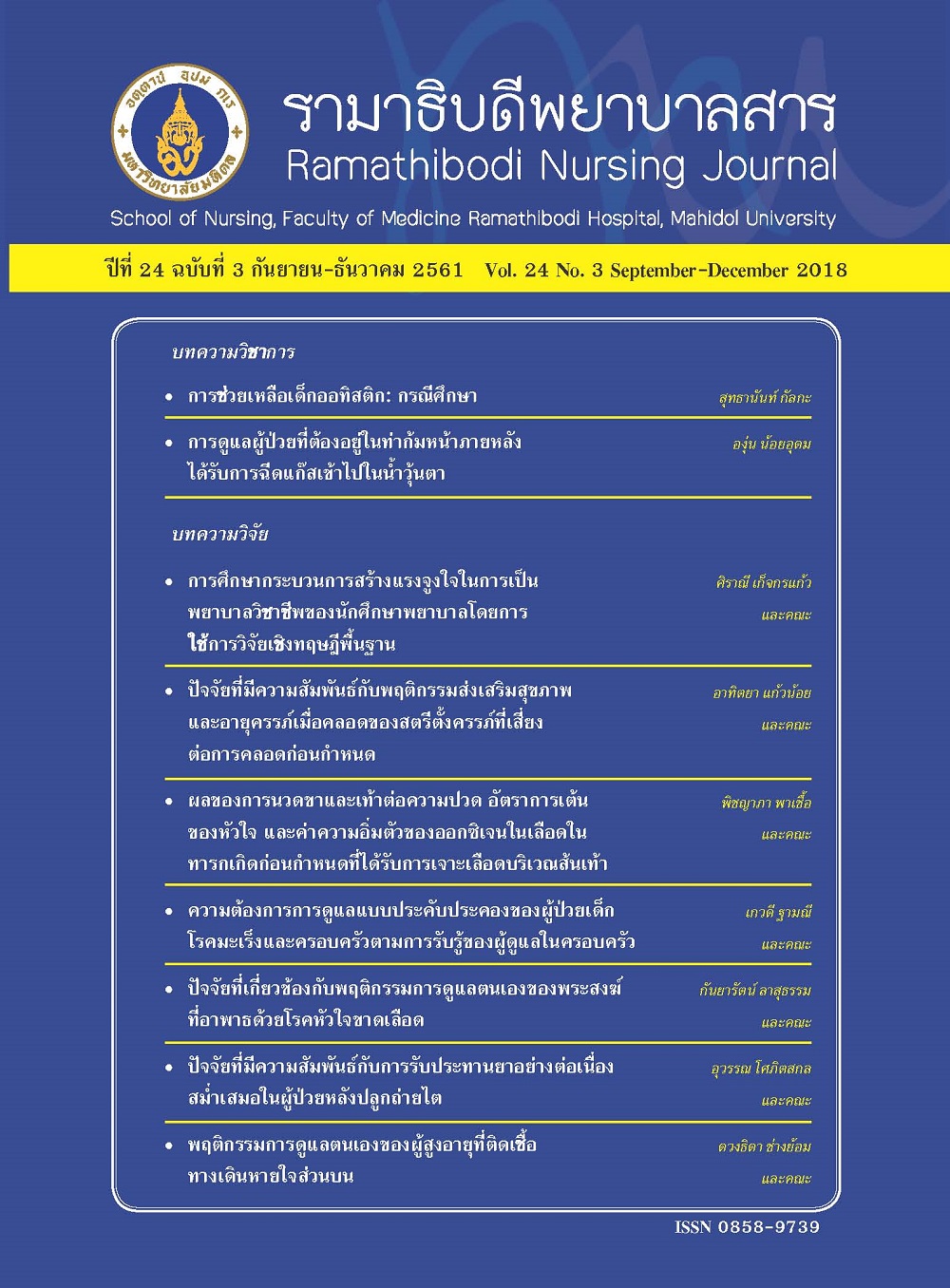Palliative Care Needs of Children with Cancer and Their Families as Perceived by Family Caregivers
Main Article Content
Abstract
Abstract
This qualitative descriptive research aimed to study palliative care of children with cancer and their families as perceived by family caregivers. The participants were 15 family caregivers of children who died from cancer and had received treatment and palliative care at Ramathibodi Hospital. Data on palliative care needs of the children with cancer and their families were collected by interview and were analyzed by content analysis. The findings of this study revealed that palliative care needs of the children and their families could be divided into 6 aspects: Treatment information; caring for illness of children; psychological care; spiritual care and end-of-life care; support for caring and bereavement care.Understanding this study could enable the nurses and health providers to evaluate and give palliative care that meets the requirements of children and their families and used to better their quality of life at the end of life.
Article Details
บทความ ข้อมูล เนื้อหา รูปภาพ ฯลฯ ที่ได้รับการตีพิมพ์ในรามาธิบดีพยาบาลสาร ถือเป็นลิขสิทธิ์ของวารสาร หากบุคคลหรือหน่วยงานใดต้องการนำทั้งหมดหรือส่วนหนึ่งส่วนใดไปเผยแพร่หรือเพื่อกระทำการใด ใด จะต้องได้รับอนุญาตเป็นลายลักษณ์อักษรจากรามาธิบดีพยาบาลสารก่อนเท่านั้น
References
2. Ministry of Public Health. Public health statistics 2016; 2017. [cite 2018 June 20]. Available from http://bps.moph.go.th/new_bps/sites/default/files/health_strategy2559.pdf
3. Wolfe J, Orellana L, Ullrich C, Cook EF, Kang TI, Rosenberg A, et al. Symptoms and distress in children with advanced cancer: prospective patient-reported outcomes from the pediQUEST study. J Clin Oncol. 2015;33 (17):1928-35.
4. Bates AT, Kearney JA. Understanding death with limited experience in life: dying children’s and adolescents’ understanding of their own terminal illness and death. Curr Opin Support Palliat Care. 2015;9(1):40-5.
5. Dussel V, Joffe S, Hilden JM, Watterson-Schaeffer J, Weeks JC, Wolfe J. Considerations about hastening death among parents of children who die of cancer. Arch Pediatr Adolesc Med. 2010;164: 231-37.
6. Weaver MS, Heinze KE, Bell CJ, Wiener L, Garee AM, Kelly, KP, et al. Establishing psychosocial palliative care standards for children and adolescents with cancer and their families: an integrative review. Palliat Med. 2016;30 (3):212-23.
7. World health organization. WHO definition of palliative care. 1998. [cite 2014 February 10]. Available from World Health Organization Website http://www.who.int/cancer/ palliative/ definition/en/
8. Huijur HA, Sagherrian K, Tamim H. Quality of lift and symptom prevalence in children with cancer in Lebanon: the perspective of parent. Ann Palliate Med. 2013;2 (2):59-70.
9. Lichtenthal WG, Corner GW, Sweeney CR, Wiener L, Roberts KE, Baser RE, Li Y, et al. Mental health services for parents who lost a child to cancer: if we build them, will they come?. J Clin Oncol. 2015;33(20):2246-53.
10. Hudson BF, Oostendorp LJM, Candy B, Vickerstaff V, Jones L, Lakhanpaul M, et al. The under reporting of recruitment strategies in research with children with life-threatening illnesses: a systematic review. Palliat Med. 2017;31(5):419-36.
11. Phirojkul S. Pediatric palliative care: why, when, and how; 2012 [cite 2013 June 18]. Available from Website: http://www.md.kku.ac.th/palliativecare/paper/ 2012May23 Fri23320h 51DD1c.pdf (in Thai)
12. Sittichanbuncha Y. ER palliative care. In:Sittichanbuncha Y, Phaisansuthidethch U, Paveenawat S, editors. National forum of palliative care: the harmony of education to service.Bangkok: Faculty of Medicine Ramathibodi Hospital, Mahidol University; 2011. p.133-47. (in Thai)
13. Wolfe J, Hammel JF, Edwards KE, Duncan J, Comeau M, Breyer J, Aldridge SA, Grier HE, Berde C, Dussel V, Weeks JC. Easing of suffering in children with cancer at the end of life: is care changing? J Clin Oncol. 2008; 26:1717-23.
14. Institute for patient-and family-centered care.Advancing the practice ofpatient-and family-centered care in hospital; 2010. [cite 2014August15]. Available from Website: http://www.ipfcc.org/pdf/getting_started.pdf
15. American Academy of Pediatrics (AAP). Pediatric palliative care and hospice care commitments, guidelines, and recommendations. Pediatrics. 2013;132,966-72.
16. Yoddumnern-Attig B, Tangchonlatip K. Qualitative dataanalysis: management and interpretation. Institute for Population and Social Research, Mahidol University; 2009. (in Thai)
17. Knapp CA, Thompson L. Factors associated with perceived barriers to pediatric palliative care: a survey of pediatricians in Florida and California. Palliat Med. 2011;26(3): 268-74.
18. Latha MS, Thirugnasambandam RP, Balakrishnan N, Meghanathan HS, Moorthy A, Venkatraman P, et al. The need of pediatric palliative care education among pediatric postgraduates in south india. Indian J Pediatr. 2014;81(5):455-9.
19. Dalberg T, Jacob-Files E, Carney PA, Meyrowitz J, Fromme EK, Thomas G. Pediatric oncology provide perceptions of barriers and facilitators to early integration of pediatric palliative care. Pediatr Blood Cancer. 2013;60:1875-81.
20. Jones B, Gilmer MJ, Parker-Raley J, Dokken DL, Freyer DR, Sydnor-Greenberg N. Parent and sibling relationships and the family experience. In: Wolfe J, Hinds PS, Sourkes BM, Editors.Textbook of interdisciplinary pediatric palliative care.USA: Elsevier; 2011. p.135-47.
21. Kars, MC, Grypdonck, MHF, van Delden JJM. Being a parent of a child with cancer throughout the end-of-life course. Oncol Nurs Forum. 2011;38(4),E260-E71.
22. Cleve LV, Munoz CE, Riggs ML, Bava L, Savedra M. Pain experience in children with advanced cancer. J Pediatr Oncol Nurs. 2012;29(1):28-36.
23. Wiener L, Mcconnell DG, Latella L, Ludi E.Cultural and religious considerations in pediatric palliative care. Palliat Support Care. 2013;11(1):47-67.
24. Wakefield CE,McLoone J, Goodenough B, Lenthen K, Cairns DR, Cohn RJ.The psychosocial impact of completing childhood cancer treatment: a systematic review of the literature. J of Pediatr Psychol. 2010;35(3):262-74.
25. Cataudella DA, Zelcer S. Psychological experiences of children with brain tumors at end-of-life: parental perspectives. J Palliat Med. 2012;15(11):1191-7.
26. Kirk S, Fraser C. Hospice support and the transition to adult services and adulthood for young people with life-limiting conditions and their families: a qualitative study. Palliat Med. 2014;28(4):342-52.
27. Flavelle SC. Experience of an adolescent living with and dying of cancer. Arch Pediatr Adolesc Med. 2011;165(1):28-32.
28. Neilson S, Gibson F, Greenfield SM. Pediatric oncology palliative care: experiences of general and practitioners bereaved parents. J Palliat Care Med. 2015;5(2):214-28.
29. Inglin S, Hornung R, Bergstraesser E. Palliative care for children and adolescents in Switzerland: a need analysis across three diagnosis groups. Eur J Pediatr. 201;170:1031-8.


